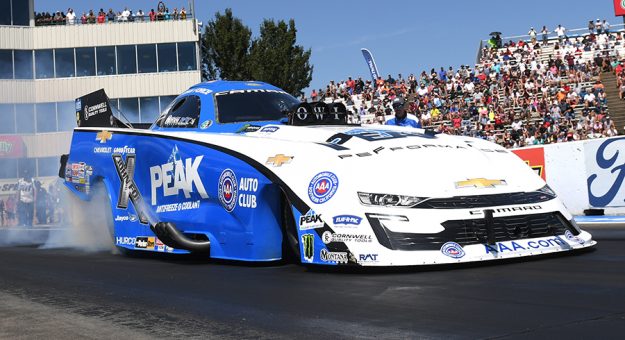SNOHOMISH, Wash. – It’s not uncommon for frequent travelers to stop deliberately on occasion, look around and remind themselves where they are. Psychologists probably have a name for the syndrome.
Those who have such a lapse while following the NHRA Camping World Drag Racing Series tour need only to go to the concession stands. If they see funnel cakes and curly fries, they’re at Bristol (Tenn.) Dragway. If they see nachos and churros, they’re at California’s Auto Club Raceway at Pomona If they see tenderloins, they’re at Indianapolis.
That’s a broad-brush statement, but it’s pretty close to the truth.
Top Fuel rookie Buddy Hull observed something similar, not with food, but with the fans — and he thinks it provides a marketing approach that just might hold the key for NHRA to grow the sport exponentially.
He noticed the nuances of each market — the culture there — that professional drag racing visits and suggested the sanctioning body might want to pay close attention.
“They’re all cool. Some are cooler than others, but they’re all cool,” he said. “What’s funny is, the fans are different at every track you go to. They really are.”
Glancing around Lucas Oil Raceway at Indianapolis during the recent Dodge SRT U.S. Nationals, Hull, whose hometown is the central Illinois burg of Jacksonville and who spent 14 years living in downtown Chicago, said, “These are midwestern folks. This is what I grew up with.
“But you go up to Epping, New Hampshire, and it’s a different crowd. You go to Pomona, it’s a different crowd. There is a big difference when you compare Epping to Indy to Pomona. They are three different groups of people,” he said.
For Hull, that’s encouraging, evidence that the demographics and psychographics of the various audiences offer NHRA a broad spectrum of corporate opportunities. That exposes the sport to a variety of consumer segments.
As his Top Fuel classmate Leah Pruett said, “With the exposure comes the value. When you have value, you have partners. When you have partners, you have money that’s going into the sport, that’s making the experience better for everybody.”
Hull said, “It just proves that there’s a lot of different demographics that actually enjoy drag racing. But it’s accurate because they’re the same people, but they’re not the same people. They have very different interests and their culture in their region is very different. So it makes me believe that there is a lot of hope for us.
“It brings me to this: The powers that be need to look at that and market us one way on the East Coast, market us one way in the Midwest and market us a different way on the West Coast. It’s a different marketing program. I mean, you’ve got to know that different nationwide companies market differently in New Hampshire than they do in California. The commercials are not the same. Their ads are not the same. Why are ours?
“We’re trying to do the same thing everywhere we go. We expect people to act our way. No, we’ve got to act their way,” he said.
Hull knows very well that racing is a business.
“So I’m a business person. At heart, I’m a businessperson. I’m an entrepreneur. I’m a partner in four other companies,” he continued. “I own a construction company solely. I’m always thinking about business. This is a business. This is a huge money business,” said Hull, who has spent many years as a corporate executive. “So if you’re not managing it the right way and you’re not thinking about it the right way, it’s not going to work.”
Peter Gent’s semi-autobiography “North Dallas Forty,” which gives a peek at the NFL and presumably the Dallas Cowboys franchise, comes to mind. The author portrays the front office as emphasizing to the players, especially when the players want to discuss financial concerns, that football is a game, yet telling them when it’s convenient that football is a business.
It’s imperative to recognize both sides of the coin at the appropriate times and that practice is not unique to NHRA. It applies to all sports.
Hull didn’t in any way imply it, but NHRA certainly trades on the nostalgia, the romance, of the sport — sometimes while neglecting to budget for expenses it should address.
“It’s somewhere in between,” the pragmatic Hull said.
He’s right. Drag racing is a sport. But it’s one of hundreds of consumer choices in the entertainment industry. In other words, it’s a business.
“That’s why there are different departments. That’s why there’s a marketing department. That’s why there’s a tech department. That’s why there’s an executive-level department of NHRA. At least that’s what I think,” Hull said. “I don’t know. I honestly don’t know what they do. I don’t really know. I know what the tech department does. We deal with them every week. But other than that, I don’t know what anybody does. None of my business.”
But the business of NHRA’s business is every fan’s business.
